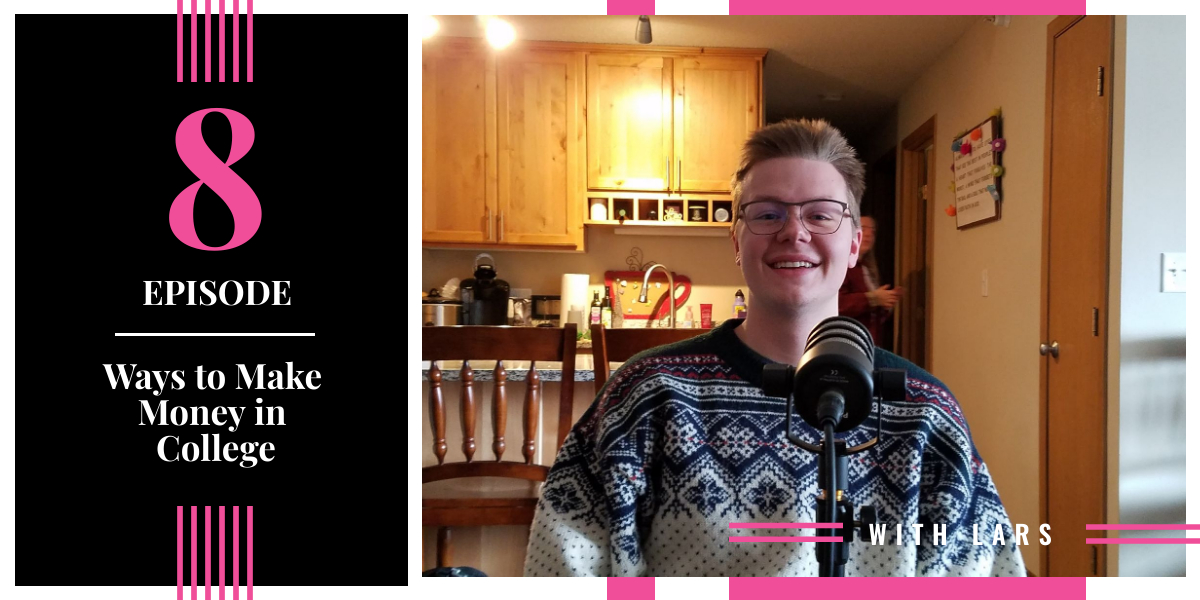In this episode, we interview entrepreneur Lars Erickson about the different ways he makes an income to pay for his college tuition! From utilizing apps for dog sitting and odd jobs, to plowing snow, this guy will tell you a bit about return on investment.
In this episode, we talk with Lars Erickson about his business ventures. they are the result of apps, personal connections and the cleaver utilization of the resources available to him.
Bekkah: Today with us, we have Lars. He is a student at the University of Minnesota-Duluth right now, and he has had some pretty cool experiences trying out different ways to make money, so we’re gonna talk to him about that. Thank you so much for joining us today!
Lars: Yeah of course! Thank you for having me!
What Ways Do You Make Money in College As An Entrepreneur?
Lars: Yeah so my name is Lars Erickson and I am a student at the University of Minnesota, like Bekkah said. I do a lot of different things to make money. I work two different jobs at the university. I work in the food service and Dining Center, and I work on the grounds crew doing snow removal, and cutting grass when there’s no snow. But it’s Duluth so there’s always snow. I started to plow service this year and I started using app services to make a little extra cash on the side. Rover and Takl are two of the main apps that I use. Rover is a dog-sitting app and Takl is for moving, yard work, and home services. How many jobs was that? Four, five? And then I’m lucky enough to be a landlord at my current residence. It’s my grandma’s old house that I tore apart, renovated, now live there, and rent the second floor out to some people. So those are the ways that I make money while I’m in school. It keeps me very, very busy so I don’t have a lot of free time, but yeah!
Bekkah: Okay so we’re really excited to talk about this and learn how you get started with them. But first of all, why did you get started with them?
Lars: I’m a firm believer in taking the opportunities when they come. I’m in an entrepreneurship major so being able to be a part of application work and building my own companies is kind of what I like to do. My dad is an entrepreneur and so I grew up in the business building world. Because of that, I’m super used to it, and I love to do it. Takl, Rover, the plow service they all enable me to grow businesses and gain experiences. And what is life without experiences? How could I ever hope to mentor people without experiences? If you have nothing to prove yourself to people with, how are they going to trust you? That’s the main reason that I do this, compensation aside.
Ruthie: Tell us a little bit about mentoring. What have you been doing to invest in other people?
Lars: Mentorship? I’m a part of campus ministry. We lead small groups and we lead teams. Last year I led a small group and got to mentor some people in their faith and through their early college experiences. This year I run our tech team with Courtney, who is leading it with me. I get to lead people and mentor them and teach them on using sound products, mixing sound in a stereo setting, and doing recordings. That kind of thing.
What Is Takl & What Do I Have To Do to Use It?
Bekkah: I really want to hear more about Takl. How did you get into using this app? How did you hear about it?
Lars: Takl is an app for home maintenance work that you don’t want to do or you can’t do. There’s also some auto and lawn maintenance. like car fixing, yard cleanup, snow removal, moving if you’re moving locations, that kind of stuff. a customer can post a job posting for a rate that they’re willing to pay and then providers can use the app to search for jobs near them. They’ll be able to pick and choose what compensation they want based off of what the client is offering.
Bekkah: Okay and would you say that you’re a provider?
Lars: Yes! I’m a provider. I’ve never been on the receiving end of it. I’ve only ever provided.
Ruthie: Okay and how did you get started? Did you have to go through a background check or whatever so they’re not like, “This crazy person is coming to help me move and they’re going to steal all my stuff, or whatever.”
Lars: Yeah! Well, so I first found out about the app actually from a billboard and then I googled it and researched it a little bit. Then I thought, “Oh this seems interesting. I really should look into this more.” It was very, very new when I started. They had just kicked off the program so the application was very rudimentary. And so to sign up you go into the app and you say, “I’m gonna sign up as a provider or I’m gonna sign up as a receiver, client.” I signed up as a provider but you have to sign up as a client in order to be a provider so that you can use both services.
I am able to post job postings, but I just do all my work myself so I’ve never needed to. I signed up then the app had to do it’s work. It goes through all the steps of a job application. So you’ll need your social security number, all of your information, forms of identification, that kind of thing. And then you have to wait I think it’s a week, or maybe week and a half until they get back to you and approve your applications.
Bekkah: Were you nervous when you did that, originally?
Lars: No.
Bekkah: Not like, “Oh! I’m giving all my information to this app!”
Lars: No, I wasn’t. The only reason I wasn’t nervous was because I know what jobs need in order to run W-2s and 1099s. I knew all the stuff they asked for was just the basic information, and frankly, giving away your social security number, your social security number is the most unsafe, safe number in existence because you use it on everything, but nobody else is supposed to know it. That just doesn’t make a lot of sense.
Ruthie: I’m also a Takl provider and when I signed up for it, I definitely thought, “What the heck am I getting into?” I texted Lars and asked, “Is it supposed to give me this sketchy feeling.” Then I believe it took about seven days for them to run the background check for me. They like sent an email saying basically, “Hey, you’ve been approved.” And I was just like, “What are they going to find!?”
What Do The Fees Look Like to Use Takl?
Bekkah: Did you have to put any kind of credit card information in or anything like that to be able to pay?
Lars: That’s a very good question. To be honest, I don’t remember.
Ruthie: There’s a thirty dollar fee.
Lars: Yeah, there’s a thirty dollar fee for being a provider. So they need your credit card for that, obviously. In terms of payment, I know Rover pays sitters through PayPal. So I can transfer the money from Rover, out to PayPal, and then from PayPal to my accounts. They use a secure PayPal network, so that Rover isn’t responsible for the transactions of your finances. I can’t recall if Takl does that as well. It’s been a while since I used the app. I can explain some reasons why I don’t thoroughly enjoy using the app.
Lars: One of my biggest issues with the Takl app is that it randomly turns off my provider status. In your profile as a provider you have a little “provider” tab that you can switch on to say, “Yes, accept, I’m ready to provide.” I want it on all the time so that when jobs pick up and I’m not there or I’m not doing something else, I can just go do the job really quick and then be done. But the app turns that switch off on its own so frequently that I often end up forgetting that I even have Takl. I have mostly done jobs on Takl down in the Twin Cities area. I haven’t done so many up in Duluth because people in Duluth don’t use the app very much. I have seen a couple of jobs, but the compensation offered wasn’t really worth my time.
Bekkah: What’s the cut that they’re taking out of it and how do you calculate what is worth your time?
Lars: I use a gut feeling to decide on what’s worth my time or not. And what I’m doing in the moment will make a difference. If I have two hours before work and I make twelve to fifteen dollars at work, is twenty dollars for three hours of work worth it? Not really. That’s the other problem with Takl. The clients set their own prices. People tend to be very stingy. I look at a job and I’m like, “Wow twenty dollars to clean up their entire yard, trim all their hedges, mow their lawn, pick everything up, and dispose of it.” That disposal fee alone is probably going to be twenty dollars.
Ruthie: Has it been worth it financially for you? You paid the $30 fee, do you think that that’s been covered already or has it been not profitable for you?
Lars: I’d say Takl has not been profitable, in my experience. However, the connections made by meeting of the people that you are providing for is worth it. Even though those connections may not lead to a fiscal compensation, it’s ultimately building your network. In terms of building business and in terms of providing for people in the labor markets, (dog sitting, and plow services) your networks are everything. That’s basically the same for any startup. Your connections are crucial.
What Is The Rover App, and How Does It Work?
Lars: Rover is a dog sitting app that I learned about from my sisters. Both of my two older sisters have been using Rover on a very consistent basis for the last two and a half years. They almost never live at their houses because they take so many Rover jobs. Rover is dog-sitting, so you go meet the clients and talk to them in person. You meet them, you meet their dog, you get told how to how to care for their dog, and how long they’re going to be gone for. That’s all done in person so that both parties can build trust and confidence in the arrangement. My sisters will dog sit for weeks at a time; I usually just do three to four days at a time just because that’s generally how long people will need services for in my area. People are not typically gone for weeks on end and I don’t really live in like a very high-income area. Whereas, my sisters live on the west side of the Cities, which tends to be a larger income area so those people can afford you know bigger vacations and that kind of thing. They end up sitting for weeks, two weeks at a time.
Ruthie: And they live at the house?
Lars: Yes. Rover does have three options. The full sitting option is living at the house, taking care of the dog, that kind of thing. They offer drop-in visits, so you just show up, take the dogs on a walk, take them to bathroom, feed them, spend a little bit of time with them, and then leave. You don’t live at the house, you don’t eat at the house, you then live it at your own home. The third option is just walking services. If you’re too busy to walk your dog you can pay someone to go do it.
Ruthie: Okay this seems like it would be a bigger thing in metropolitan areas. You live in Duluth and also down in the cities. Is that where most of your Takl and Rover options come from?
Lars: Yes. Any startup application and small businesses are going to have, generally speaking, a larger market in large metropolitan areas. That’s why the Twin Cities is such a huge place to start Takl, Rover, that kind of thing. Then from the large densely populated areas it kind of expands into the suburbs and smaller metropolitan areas such as Duluth.
Bekkah: Do your sisters use Rover as a full-time gig? Or what is their approach to that?
Lars: My oldest sister has graduated college. She works a full-time job and she does Rover on top of it. She’s single and not dating anyone so she has time when she’s not working. She’ll go back to the client’s house for lunch, take the dog out, go back to work, come back, spend all night with the dog, take it out in the morning, go to work… that kind of thing. She’ll be in that routine for a week or two weeks at a time. My second oldest sister is still student. She’s a nursing student but she basically does the same thing. She takes the dogs out, goes back to the client’s house for lunch, goes back to school, spends the night with the dogs… that kind of thing. The work tends to be very flexible as dogs take care of themselves relatively well. Though not nearly as well as a cat would. You probably wouldn’t really even need a provider to take care of your cat.
How Much Do You Get Paid With The Rover App Versus The Takl App?
Bekkah: What’s the going rate for Rover? Is it dependent on the area?
Lars: The going rate as a provider… I actually set my rates. Rover gives you some recommendations on where to start setting your rate and then you can move it up in time. I started my rate at fifty dollars a night for one dog with an additional $25 per dog, per night. Since starting I have moved it up to $75 a night with $25 per extra dog.
Bekkah: Okay and have you ever, or maybe your sisters too, are there safety precautions? How do you know when you’re going to stay somewhere that no one’s just going to show up at their house? What does that look like because I think that would be a little uncomfortable.
Lars: Yeah, well, I don’t really think about it. That’s never really crossed my mind, but typically my experience is that the owners let their neighbors know that, “Hey, I’m going to be out of town so this person is watching my dog and they’re going to be living at my house.” Then they give the neighbors the model of the car, just so they don’t get sketched out. In terms of people just showing up, I’ve had one person say, “Hey, my ex-wife might show up asking for the car. Don’t let her in.” And I’m like, “Okay!” Fortunately, the ex-wife never showed up. In my experience, there’s been people coming and going from the house, but really nothing to be super concerned with. The people are typically pretty informative.
Bekkah: Okay. How many jobs have you taken in total between those two?
Lars: I don’t know. I’ve taken a lot more jobs in Rover than Takl just because I prefer the service. Rover’s compensation rate is about fifteen percent though. The app takes a pretty large chunk of what you’re making because all the payments and stuff are done through it. There are penalties if you don’t go through the app. They force you to use the app. They force you to pay through the app. They force you to do everything through the app. That’s so can pull compensation from your end and also their end. Let’s say my job is worth $100, I’ll probably make $80 because they take about 20 percent or 15 percent on my end but they also charge the customer for paying me. So they’re making money through both the provider and the customer.
Bekkah: Sounds like you need to make your own app with a better compensation rate!
Lars: If I knew how to program, yeah.
Bekkah: There needs some competition out there.
Lars: Yeah but, overall, I love Rover. Rover led me to to a couple that I then got in contact with and have worked with a few times. I’m never there when they get home. They tell me when they get home. They give me some ETA, “Oh, I’ll be home around five o’clock.” I leave at about 4:30. I’ll take the dog out, wash all the sheets,fold all the sheets or I make the bed depending on what the timeline looks like, and then I write a handwritten note saying, “Hey, it was great to watch your dog. This is done, this is done, this is done. I cleaned everything. Hopefully, it’s better than when you left it. If there’s anything else you need, whether, it’s manual labor, help doing this, help doing that, or watching your dog again, I would love to be your first point of contact.” When I did that with this couple they recommended me to an old woman that lives next to them. The person that plowed their driveway just graduated college and moved away so she was looking for somebody new and they’re like, “Hey, do you want to do it? This person used to plow my driveway and hers. It’s for X dollars per snow.” I started plowing their driveways and then was like, “Wow! This is really easy and makes me a decent amount of money.” That convinced me to start expanding my plow contracts, if you will. They’re all unofficial contracts and cash payments so it’s not an official business, but every time it snows I make about 100 to 120 dollars.
Bekkah: Okay. Did you have to go out and buy a plow for your truck? Did you already have that?
Lars: I use a snowblower, primarily. However, I do have my dad’s Bobcat out at my property and I have a trailer for it, so if it’s a really large snow I will load a bobcat into the trailer, strap it down bring it to Duluth, unload it, and do everybody’s driveways with the Bobcat. I do my driveway with the Bobcat, because it’s a quarter-mile long.
Bekkah: So, basically, you are mooching off your parents’ investments as well.
Lars: Well, yes and no. I’ve gotten permission to use it for this purpose. And pay a small stipend to use it.
What Does Insurance Look Like For Rover and Takl?
Bekkah: As you’re looking at doing these different things, does Takl and Rover have any kind of liability insurance or do they just do the background check? What if someone’s say water line breaks while you’re in the house and they’re like, “You did this!”
Lars: I know Rover has liability insurance. I would assume Takl has liability insurance, as well, just because it’d be stupid not to. I could turn around and sue them for a whole slew of things that could happen if they didn’t. For a client to try to sue me because I was a Takl provider or a Rover provider, I know that Rover does. I’m not sure about Takl, but I would assume that both of them do.
Bekkah: Okay. You had mentioned earlier that at the end of the year the companies will send you a tax form, and you just put those on your taxes while you’re filing.
Lars: Yes. They just send me an update saying, “Hey there’s this and that. This is how much you’ve made. This is how much we’ve held. Here’s your tax form. Just file it.”
Side Note: Be sure to listen to our podcast recording to hear our Sister Gawk portion of the show!
Bekkah: Thanks Lars for joining us this week, we’ll see you all next week!




